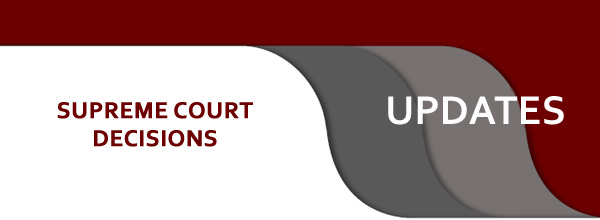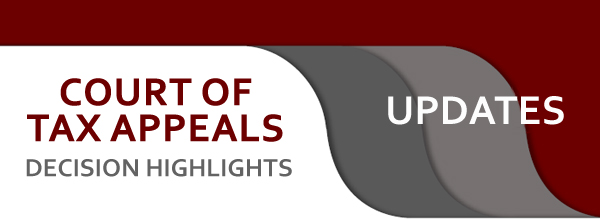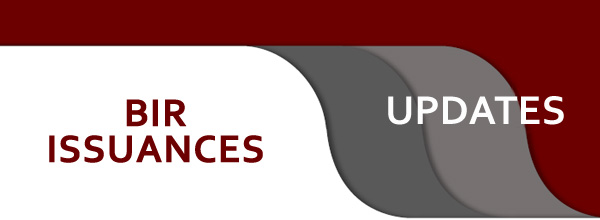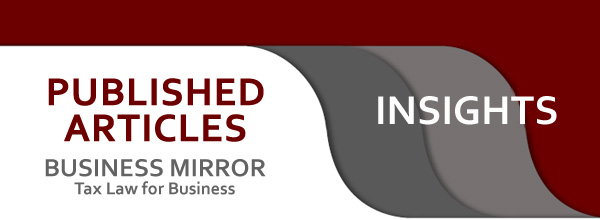

NOVEMBER • VOL. 10 • SERIES OF 2023
INSIGHTS is a monthly publication of BDB LAW to inform, update and provide perspectives to our clients and readers on significant tax-related court decisions and regulatory issuances (includes BIR, SEC, BSP, and various government agencies).

DISCLAIMER: The contents of this Insights are summaries of selected issuances from various government agencies, Court decisions, and articles written by our experts. They are intended for guidance only and as such should not be regarded as a substitute for professional advice.
Copyright © 2023 by Du-Baladad and Associates (BDB Law). All rights reserved. No part of this issue covered by this copyright may be produced and/or used in any form or by any means – graphic, electronic, and mechanical without the written permission of the publisher.
What's Inside ...
- HIGHLIGHTS FOR OCTOBER 2023
- SIGNIFICANT COURT DECISIONS
- Supreme Court
- Court of Tax Appeals
- SIGNIFICANT REGULATORY ISSUANCES
- Bureau of Internal Revenue
- Securities and Exchange Commission
- PUBLISHED ARTICLE
- Refund: Substantiation of Unutilized Input VAT No More
- OUR EXPERTS
- The Personalities
- The Personalities


HIGHLIGHTS for OCTOBER 2023
SUPREME COURT DECISIONS
-
The 60-day period for the submission of relevant supporting documents is from the filing of the administrative
protest to the FLD, when such protest constitutes a request for reinvestigation, and not from the response or
reply to the PAN. (Commissioner of Internal Revenue v. Maxicare Healthcare Corporation, G.R. No. 261065. July
10, 2023)
COURT OF TAX APPEALS DECISIONS
-
When a taxpayer-claimant has excess input VAT carried over from the previous period, it need not
substantiate the same for purposes of establishing its entitlement to a refund of excess input VAT from zero rated sales. (Rema Tip Top Philippines, Inc. vs. Commissioner of Internal Revenue, CTA EB Case No. 2623, October
4, 2023) -
Sweetened beverages, that are subject to SBT are defined as non-alcoholic beverages of any constitution
(liquid, powder, or concentrates) that are pre-packaged and sealed in accordance with FDA standards, that
contain caloric and/or non-caloric sweeteners added by the manufacturers. (Nestle Philippines, Inc., v.
Commissioner of Internal Revenue, CTA Case No. 10276, October 6, 2023) -
The taxpayer must be notified of the CIR’s acceptance of the waiver to be valid. (Commissioner of Internal
Revenue v. Medicard Philippines, Inc., CTA EB No. 2603, October 11, 2023)
BIR ISSUANCES
- RMO No. 109-2023, October 13, 2023 – This announces the availability of the Taxpayer Registration-Related
Applications Portal. - RMO No. 33-2023, September 29, 2023 – This reiterates Section 3.J of RR No. 17-2003 on the withholding of
taxes for the sale of real property on installment plan. - RMC No. 112-2023, October 17, 2023 – This provides clarification on the duty of the FDDA to determine the
classification of beverages pursuant to Sec. 150-B of the Tax Code.
SEC ISSUANCES
- SEC Memorandum Circular No. 19 series of 2023 – This prescribes guidelines on declaration of delinquent status and
revocation of certificate of registration of corporations under Sections 21 and 177 of the RCC. - SEC Opinion No. 23-11 – This provides for the inquiry regarding the sale of unissued shares at a premium:
Pre-emptive Rights.


The 60-day period for the submission of relevant supporting documents is from the filing of the administrative protest to the FLD, when such protest constitutes a request for reinvestigation, and not from the response or reply to the PAN.
The taxpayer received a Preliminary Assessment Notice (PAN) finding it liable for deficiency VAT. In response, the taxpayer filed its protest. Notwithstanding such protest, a Formal Letter of Demand (FLD) was issued against it. The taxpayer decided to file a protest requesting a reinvestigation. In addition, the protest stated that it shall submit within sixty (60) days from the date of filing hereof the pertinent supporting documents and additional explanations on the foregoing items in the assessment. Despite said protest, the Commissioner of Internal Revenue (CIR) still issued the Final Decision on the Disputed Assessment (FDDA) thirty (30) days after the filing of the protest to the FLD.
The Supreme Court held that the reckoning point of the 60-day period for the submission of relevant supporting documents is from the filing of the administrative protest to the FLD, when such protest constitutes a request for reinvestigation, and not from the response or reply to the PAN. This pronouncement cleared the erroneous statement previously made in a prior Minute Resolution of the Supreme Court held in Commissioner of Internal Revenue v. Roca Security and Investigation Agency, Inc.
Clear from Section 228, when read together with Revenue Regulation (RR) No. 12-99, that the 60-day period for submission of relevant supporting documents refers to the protest to the FLD when the same is a request for reinvestigation and not the response to the PAN. (Commissioner of Internal Revenue v. Maxicare Healthcare Corporation, G.R. No. 261065. July 10, 2023)


When a taxpayer-claimant has excess input VAT carried over from previous period, it need not substantiate the same for purposes of establishing its entitlement to a refund of excess input VAT from zero-rated sales.
The Court ruled that to qualify for zero-rating, sales to Non-Resident Foreign Corporations should be supported with at least two (2) documents, namely: (1) the Securities and Exchange Commission (SEC) Certificates of Non-Registration; and (2) the Articles or Certificates of Foreign Incorporation, printed screenshots of the foreign SEC website showing the state/province/country where the entity was organized, or any similar document.
The taxpayer, however, failed to present the two (2) required documents. In addition, the taxpayer was not denied due process because it was given the opportunity to present supporting documents for its claim for refund. Unfortunately, it opted to submit blurred and/or unreadable ORs which the court failed to appreciate in the resolution of the case. For the disallowance of sales and purchases due to non-compliance with invoicing requirements, the Court held that the Court of Tax Appeals (CTA) - First Division ably observed and determined that some of the ORs and invoices do not comply with the invoicing requirements.
As for the claim for refund, the CTA En Banc held that the taxpayer is entitled to a VAT refund. When a taxpayer-claimant has excess input VAT carried over from the previous period, it need not substantiate the same for purposes of establishing its entitlement to a refund of excess input VAT from zero-rated sales. The declared excess input tax carried over from the previous period is presumed correct and is used to cover or pay for the output VAT due in the period of claim. (Rema Tip Top Philippines, Inc. vs. Commissioner of Internal Revenue, CTA EB Case No. 2623, October 4, 2023)
The day of the crime’s commission would be the day immediately after the expiration of the period to pay as contained in the final demand issued by the BIR.
A criminal case was filed against the accused for violation of Section 255 of the Tax Code. The Information states that on or about September 2015, the accused willfully and knowingly failed to pay deficiency VAT for the taxable year 2008.
The CTA however, found that the right to institute criminal action has already prescribed. Section 281 of the Tax Code provides that the period of prescription for the offense charged is five (5) years.
In Emilio E. Lim, Sr., et. al. vs. Court of Appeals, et. al., the Supreme Court interpreted the said provision to mean that the cause of action of the BIR accrued only at the time the final notice and demand for payment was served on the taxpayer. This is because prior to the receipt of the letter-assessment, no violation has yet been committed by the taxpayers. The offense was committed only after the receipt was coupled with the willful refusal to pay the taxes due within the allotted period. Following such, the day of the crime’s commission would be the day immediately after the expiration of the period to pay as contained in the final demand issued by the BIR. The present Information in the case has already prescribed considering that almost eight (8) years had already elapsed from the alleged date of the crimes’ commission to the filing of the Information. (People of the Philippines vs. PGU General Merchandise, Inc., CTA Crim. Case No. O-1081, October 12, 2023)
The mere fact that the taxpayer’s application for zero-rating has been approved by the CIR does not, by itself, justify the grant of a refund or tax credit.
The taxpayer averred that the CTA Second Division erred in holding that its sales to a Board of Investment (BOI)-registered entity, do not qualify as zero-rated sales because it allegedly failed to provide proof that the said entity had at least 70% export sales in the entire previous calendar year since the BOI Endorsement Letter it presented only covered January to November 2016. According to the taxpayer, there is no legal basis to require a BOI Endorsement that covers the entire previous year.
The Court held that Section 106(A)(2)(a)(3) of the Tax Code as implemented by Section 4.106-5(a)(3) of RR No. 16-05, expressly provides that for sale of raw materials or packaging materials by a VAT-registered entity to an export-oriented enterprise be subject to VAT zero-rating, the export sales of the said enterprise must exceed 70% of its total annual production. In this case, the BOI Letter Endorsement for VAT zero-rating presented for the said enterprise only covers January to November 2016. Without the information for December 2016, the Court cannot ascertain whether it indeed made export sales exceeding 70% of its total annual production of the preceding CY 2016.
Further, on the taxpayer’s assertion that the specific sale invoices generated through its Computerized Accounting System, which is duly registered with and approved by the BIR, should be deemed sufficient for purposes of complying with the Tax Code, as amended, and other BIR regulations pertaining to invoicing requirements, the same must likewise fail.
Moreover, the sales invoice must indicate the nature or description of the goods sold, and, in case of sales where the amount is P1,000.00 or more, the TIN of the purchaser must be indicated. Since the taxpayer failed to comply, the petition must fail. (Tetra Pak Philippines, Inc. vs. Commissioner of Internal Revenue, CTA Case No. 10237, October 9, 2023)
A discrepancy in the name of accused corporation in the caption of the case, Information and in the records of the BIR casts doubt on the identity of accused corporation.
The CTA found that there is a discrepancy in the name of accused corporation in the caption of the case, Information and in the records of the BIR. The Letter of Authority, Preliminary Assessment Notice (PAN), Formal Letter of Demand (FLD), and Final Notice Before Seizure, were all issued in the name of "Market Solutions Corporation." The Referral Letter for filing and institution of criminal complaint state the name of accused corporation as "Market Solutions Corporation" while the name of accused in the caption of the case, in the Information and in the Resolution state the name "Market Solution/Bremel Peter Guiao." The Court noted that there is no letter "s" in the word "Solution" and the word "Corporation" is missing. The said discrepancy casts doubt on the identity of accused corporation. Moreover, in the caption of the case, accused Guiao is charged in his capacity as the President of accused corporation. However, the position held by accused in the corporation was not stated in the Information. It merely stated that "the above-named accused, being the responsible officer of Market Solution Corporation." Based on records, the Court finds that there is no proof that accused Guiao was acting in said capacity during the time of the alleged commission of the crime charged. (People of the Philippines vs. Market Solution/Bremel Peter R. Guiao, In his capacity as Chairman/President of Market Solution, CTA Crim. Case No. O-651, October 25, 2023)
Direct Exporters must file its refund claims with the VCAD, regardless of the percentage of export sales to total sales.
The taxpayer argues that it cannot be considered as a “direct exporter” for purposes of Revenue Memorandum Circular No. 047-2019 as the volume of its sales could not warrant its classification as a direct exporter, nor is it engaged in such a line of business. Thus, the taxpayer claims that it has filed its claim for refund of excess or unutilized input tax credits with the proper office when the claim was filed with RDO No. 47 and not with the VAT Credit Audit Division (VCAD) as indicated in RMC No. 047-2019.
The Court ruled that RMC No. 47-2019 clarified the scope of direct exporters by indicating “regardless of the percentage of export sales to total sales”. With this, it is apparent that the Circular was framed to have a taxpayer-claimant file its claim with the VCAD regardless of the total sales volume and the proportion of the export sales. As such, the CIR’s revenue or tax issuances operate to provide a binding set of rules in the filing of administrative claims such as input tax refunds.
Having filed instead with RDO No. 047, the taxpayer’s administrative claim could only be considered to have been filed in the wrong office. (Schaeffler Philippines Inc., v. Commissioner of Internal Revenue, CTA No. 10301, October 17, 2023.)
The issuance of a Certificate of Tax Delinquencies/Tax Liabilities and an Acceptance Payment Form is a discretionary function of the Bureau of Internal Revenue, not a ministerial one.
The taxpayer claims that they are qualified to avail the benefits of the Tax Amnesty Act (TAA) and avers that the Bureau of Internal Revenue has the ministerial duty to issue a Certificate of Tax Delinquency/Tax Liabilities (CTD) and an Acceptance Payment Form (APF) to the taxpayers.
The Bureau of Internal Revenue (BIR) contends that the decision it makes, including the denial of application for tax amnesty, are discretionary on its part, hence are not subject to review (even by the Court).
RR No. 4-2019, as amended by RR No. 15-2020, which implements the TAA, imposes a duty upon the concerned BIR officers to evaluate whether a CTD and an APF may be issued. Such duty includes determining who is qualified to avail of the tax amnesty under the TAA, which is a discretionary function and not merely a ministerial one.
Since the determination of who is qualified to avail of the tax amnesty involves respondent’s discretionary duties, mandamus may not lie to compel the BIR to issue the CTD and sign the APF in favor of the taxpayer for that would be tantamount to a usurpation of executive functions. (Elmer S. Miguel, et. Al., v. Bureau of Internal Revenue, CTA Case No. 10415, October 16, 2023)
Sweetened beverages, that are subject to SBT are defined as non-alcoholic beverages of any constitution (liquid, powder, or concentrates) that are pre-packaged and sealed in accordance with FDA standards, that contain caloric and/or non-caloric sweeteners added by the manufacturers.
The taxpayer argues that its MILO products are milk products excluded from the coverage of the Sweetened Beverage Taxes (SBT) imposed under Section 150-B of the Tax Code. Thus, the taxpayer claims that it is entitled to a refund of illegally collected and erroneously paid SBT.
Section 47 of RA No. 10963 introduced Section 150-B in the Tax Code which provides that a tax of Php6.00 per liter of volume capacity shall be levied, assessed, and collected on sweetened beverages using purely caloric sweeteners, and purely non-caloric sweeteners, or a mix of caloric and non-caloric sweeteners. Sweetened beverages, in turn, are defined as non-alcoholic beverages of any constitution (liquid, powder, or concentrates) that are pre-packaged and sealed in accordance with FDA standards, that contain caloric and/or non-caloric sweeteners added by the manufacturers.
In the instant case, MILO products of the taxpayer are under the category of sweetened beverages because such are non-alcoholic beverages that are in powdered form, which are pre-packed and sealed in accordance with the FDA standards. Moreover, MILO products contain caloric sweeteners such as sugar, which is widely known as a sweet substance. Therefore, undoubtedly, MILO products fall to (B)(1) of the NIRC of 1997, as amended by RA No. 10963. (Nestle Philippines, Inc., v. Commissioner of Internal Revenue, CTA Case No. 10276, October 6, 2023)
The CTA has jurisdiction to rule on the constitutionality or validity of tax laws, regulations, and administrative issuances except in cases questioning the legality or validity of assessment of local taxes where the RTC has jurisdiction.
The CIR claims that the Court has no jurisdiction over the case involving the constitutionality and validity of the pertinent provisions of RMC No. 90-2012 and RR No. 17-2012.
The landmark case of Banco De Oro et al. v. Republic, et al. (Banco De Oro) settled the matter that the CTA has jurisdiction to rule on the constitutionality or validity of tax laws, regulations, and administrative issuances as Section 7 of the Republic Act No. 1125, as amended, "intends the CTA to have exclusive jurisdiction to resolve all tax problems" except in cases questioning the legality or validity of assessment of local taxes where the RTC has jurisdiction.
The Court finds no compelling reason to deviate from the assailed Decision as it is clear that the removals of the subject beer products for the year 2018 should have been subjected to an excise tax rate of only P24.44 per liter as contemplated in Section 143 of the Tax Code. (San Miguel Brewery Inc., v. Commissioner of Internal Revenue, CTA Case No. 10223, October 9, 2023)
The taxpayer must be notified of the CIR’s acceptance of the waiver to be valid.
The CIR contends that the assessment against the taxpayer has yet to prescribe when the latter received the Final Assessment Notice (FAN). The CIR claims that the first and second waivers were validly executed notwithstanding the lack of signature on taxpayer’s part in the second waiver. Thus, the assessment period was effectively extended.
The Court ruled that the first waiver duly complied with the above requirements and had thus validly extended the period to assess until March31, 2012. However, the same is not true for the second waiver. An examination thereof clearly reveals that it was not properly executed due to the following reasons: (1) the CIR or his or her authorized representative did not accept the waiver (thus lacking the required signature); (2) there is no date of the taxpayer’s execution nor date of the CIR’s acceptance; (3) it was not notarized; and (4) there is no proof that the taxpayer was notified of the CIR’s acceptance. With the glaring defects in the second waiver, it failed to successfully extend the period of assessment until June 30, 2012. Thus, when the taxpayer received the FAN on April 30, 2012, the assessment had already prescribed (since the period to assess was until March 31, 2012 only, and the CIR henceforth lost his or her right to enforce the collection thereof. (Commissioner of Internal Revenue v. Medicard Philippines, Inc., CTA EB No. 2603, October 11, 2023)
For an export sale to qualify as zero-rated, it must be shown, among others, that the payments for the substantiated export sales were made in acceptable foreign currency accounted for in accordance with the rules and regulations of the Bangko Sentral ng Pilipinas.
The taxpayer argues that the Court erred in ruling that its export sales cannot be traced to the inward remittances per bank certifications or has no proof of payment in acceptable foreign currency accounted for in accordance with rules and regulations of the Bangko Sentral ng Pilipinas.
The Court held that for an export sale to qualify as zero-rated pursuant to Section 106(A)(2)(a)(1) of the Tax Code, one of the conditions is that it must be shown that the payments for the substantiated export sales were made in acceptable foreign currency accounted for in accordance with the rules and regulations of the BSP.
Here, a perusal of the Certifications of Inward Remittances issued by Citibank N.A. reveals that only a portion of the export sales was traced to the inward remittances per bank certifications or has proof of payment in acceptable foreign currency accounted for in accordance with the rules and regulations of the BSP, and thus, satisfied the third condition. (Commissioner of Internal Revenue vs. Philip Morris Philippines Manufacturing, Inc., CTA Case No. EB 2632, October 17, 2023)
Without a Mission Order, revenue officers have no authority to conduct surveillance activities and, much less, close a business establishment.
The subject BIR officials issued the 48-hour Notice, 5-Day VAT Compliance Notice, and Closure Order without observing the procedure prescribed in Revenue Memorandum Order (RMO) No 3-2009. Thus, this prompted the taxpayer to file a Petition for Review before the Court.
The Court En Banc ruled that without a Mission Order, revenue officers have no authority to conduct surveillance activities and, much less, close a business establishment. A close reading of the guidelines and procedures set out in RMO 3-2009 shows that a Closure Order may only be issued after the taxpayer has already submitted its corresponding explanations in response to the 48-hour Notice and, later, the 5-day VAT Compliance Notice. In turn, said Notices must have been based on the results of surveillance activities conducted pursuant to a valid Mission Order.
Here, the CIR admits that the closure implemented against the taxpayer was not preceded by surveillance activities nor supported by a valid Mission Order. Thus, without a separate Mission Order, the closure effected in the present case is unauthorized and unwarranted. (Commissioner of Internal Revenue vs. Paymentwall Inc., CTA Case No. EB 2510, October 17, 2023)
The plea of the taxpayer for the relaxation of procedural rules to give way to substantial justice cannot be sustained in the face of its seemingly lackadaisical and non-judicious approach.
The taxpayer maintains that it has satisfactorily complied with the procedural requirements relative to the preparation and execution of its Verification and Certification on Non-Forum Shopping but at the same time contends that there exists ample jurisprudence that recognizes substantial compliance with the rules over a rigid and overly technical application thereof in order to afford the parties the opportunity to fully ventilate the substantive merits of their case.
The Court denied the taxpayer’s Motion for Reconsideration, rationalizing that the taxpayer was given by the Court ample opportunity to submit various documents to cure the procedural lapses/defects identified by the Court and was granted several extensions of time to comply with the Court’s directives.
The plea of the taxpayer for the relaxation of procedural rules to give way to substantial justice cannot be sustained in the face of a seemingly lackadaisical and non-judicious approach in filing a Petition for Review and in complying with the orders of the Court. (Johnny Sy Co vs. Bureau of Internal Revenue, et. al., CTA Case No. 11024, October 26, 2023)
The imposition of a mandatory ninety (90)-day period to act upon the administrative claims for refund under the TRAIN Law did not operate to repeal the jurisdiction of the Court over the “inaction” of the CIR which is considered as a “deemed denial”.
The Court ruled that the judicial appeal was filed by the taxpayer beyond the period provided by law, thus, depriving the Court of its jurisdiction.
Here, from the filing of taxpayer’s administrative claim on April 2, 2018, the Commissioner of Internal Revenue had ninety (90) days or until July 1, 2018, to act on the said claim. In case of inaction, the taxpayer has thirty (30) days from its expiration to file its judicial claim, or until July 31, 2018. However, the taxpayer filed its claim on August 13, 2018.
Harmonizing the provisions of Section 112(C) of the Tax Code, as amended by the TRAIN Law, the Court held that the imposition of a mandatory ninety (90)-day period to act upon the administrative claims for refund under the TRAIN Law did not operate to repeal the jurisdiction of the Court over the “inaction” of the CIR which is considered as a “deemed denial” appealable under Section 7(a)(2) of RA No. 1125, as amended by RA No. 9282. (Regus Service Centre, Philippines B.V. - Rohq vs. Commissioner of Internal Revenue, CTA Case No. 9907, October 25, 2023)
The inattention exhibited by the Commissioner of Internal Revenue unfairly makes the taxpayer grope in the dark and speculate as to which action constitutes the decision appealable to the tax court.
The CIR claims that the Preliminary Collection Letter (PCL) challenged by the taxpayer is not his FDDA.
The Court ruled that, first, the parties judicially admitted that it is the PCL which is the CIR’s FDDA; second, the averments in the taxpayer’s Petition for Review, which determine the jurisdiction over the subject matter, reveal that the event which prompted the latter to seek redress before the Court is the PCL it received; and third, the CIR turned deaf on the taxpayer’s simple query as to which letter constitutes the CIR’s FDDA. Thus, to overlook the inattention exhibited by the CIR would foster the circumstance which jurisprudence seeks to obviate - unfairly making the taxpayer grope in the dark and speculate as to which action constitutes the decision appealable to the tax court. (Commissioner of Internal Revenue vs. Cebu Light Industrial Park, Inc., CTA Case No. EB 2466, October 25, 2023)
A BIR Ruling that substantially increases the taxpayer’s burden requires prior notice, hearing, and publication for its validity.
The CIR and the Collector of Customs argue that the Court erred in ruling that (1) alkylate is not a "similar product of distillation" under Section 148(e) of the Tax Code; (2) Document No. M-059-2012, CIR's interpretative issuance, requires prior notice, hearing, and publication for its validity; and (3) Document No. M-059-2012 may not be retroactively applied.
Foremost, the Court ruled that the issue on the taxability of alkylate importation has already been settled by the Supreme Court, where it was categorically declared that alkylate does not fall under the category of "other similar products of distillation" and hence, not subject to excise tax.
Next, administrative rulings, such as Document No. M-059-2012, can neither expand nor restrict the scope of the law they seek to apply. It is essential that when they materially affect the substantive rights of a taxpayer, procedural due process must be diligently observed. Here, Document No. M-059-2012 did not only substantially increase the taxpayer’s burden but that it was likewise issued to treat alkylate as subject to excise tax. Consequently, such ruling should have undergone prior notice, hearing, and publication.
Finally, Section 246 of the Tax Code expressly provides that any revocation, modification, or reversal of BIR rulings shall not be given retroactive application if it would be prejudicial to taxpayers. Here, the retroactive application of Document No. M-059-2012 evidently prejudiced the taxpayer. Such retroactive imposition not only disrupted the taxpayer’s reasonable expectation that its alkylate importations were not subject to excise tax, but also imposed upon it an additional financial burden it had not anticipated. (Pilipinas Shell Petroleum Corporation vs. Commissioner of Internal Revenue, et al., CTA Case No. 8535, October 24, 2023)
A taxpayer, who, after receiving a collection letter from the BIR referring to a final assessment, subsequently receives such assessment, must file an administrative protest on said final assessment before the BIR, so as not to render an appeal to the Court premature.
The taxpayer submits, among others, that it did not violate the Doctrine of Exhaustion of Administrative Remedies.
The Court found no compelling reason to reverse or modify the assailed Decision. The Court ruled that a taxpayer, who, after receiving a collection letter from the BIR referring to a final assessment, subsequently receives such assessment, must file an administrative protest on said final assessment before the BIR, so as not to render an appeal to the Court premature.
Here, within thirty (30) days from receipt of the Final Assessment Notice, the taxpayer filed a judicial appeal before the Court without first filing a valid administrative protest with the BIR despite having every opportunity to do so. Thus, this constitutes a clear violation of the Doctrine of Exhaustion of Administrative Remedies. The Court stressed that what is appealable to the Court are decisions of the BIR on the protest of the taxpayer against the assessments. There being no protest ruling by the CIR when the taxpayer’s petition for review was filed, the dismissal of the same by the Court in Division would have been proper. (Commissioner of Internal Revenue vs. Four Seas Trading Corporation, CTA Case No. EB 2507, October 16, 2023)
The twin-period in a Petition for Relief from Judgment is mandatory, jurisdictional, and must be strictly complied with, otherwise, the petition may be dismissed outright.
The CIR avers that relief from judgment under Rule 38 of the Rules of Court is a remedy provided by law to any person against whom a decision or order is entered into through fraud, accident, mistake, or excusable negligence. The CIR anchors his prayer for relief from judgment on the ground of excusable negligence.
The Court denied the CIR’s Petition for Relief from Judgment for having been filed out of time and for lack of merit.
To avail of this remedy, the petition must comply with two reglementary periods, that is, it must be filed within sixty (60) days after the party learns of the judgment, final order, or other proceeding to be set aside, and not more six (6) months after such judgment or final order was entered, or such proceeding was taken. The twin-period is mandatory, jurisdictional, and must be strictly complied with, otherwise, the petition may be dismissed outright.
Here, the CIR's Petition for Relief from Judgment was filed out of time as it was filed beyond the two reglementary periods discussed above.
Furthermore, the facts of this case, however, do not show that there was excusable negligence imputable to the CIR. What is evident, rather, is that the CIR’s counsel did not review the cases transferred/reassigned to him, failed to notify the CIR of an adverse judgment, preventing him from making a timely motion for reconsideration. Hence, the negligence of the CIR’s counsel is binding on him. (Commissioner of Internal Revenue vs. Travellers International Hotel Group, Inc., CTA Case No. EB 2385, October 19, 2023)


Revenue Memorandum Order No. 109-2023, October 13, 2023 – This announces the availability of the Taxpayer Registration-Related Applications Portal.
This announces the availability of the Taxpayer Registration-Related Applications (TRRA) Portal on October 16, 2023. The TRRA Portal is an alternative option that can be used by taxpayers to submit registration-related applications thru email application.
To use the TRRA, taxpayer-applicants shall access the TRRA Portal through the BIR eServices icon at https://www.bir.gov.ph/ and follow the procedures below. a. Scan all the required documentary requirements in PDF copy not exceeding 4MB file size per file. The checklist of documentary requirements and the applicable form can be accessed by clicking the desired application in TRRA Portal. b. Select the frontline service to be availed of or the type of application. c. Select the RDO where the applicant is registered. In case the taxpayer is applying for TIN, the system will determine the RDO based on the address provided. Then, click the "Email your Application" button.
Revenue Memorandum Order No. 33-2023, September 29, 2023 –
This reiterates Section 3.J of RR No. 17-2003 on the withholding of taxes for the sale of real property on installment plan
RR No. 12-2023, October 2, 2023 –
This implements Section 237 of the Tax Codeon the issuance of receipts or sales or commercial invoices by Agricultural Producers
This implements Section 237 of the Tax Code on the issuance of receipts or sales or commercial invoices by Agricultural Producers.
In accordance with Section 237, all persons subject to an internal revenue tax shall, at a point of each sale and transfer of merchandise or for services rendered valued at One Hundred Pesos (₱100.00) or more, issue duly registered receipts or sales or commercial invoices.
For ease of doing business, the Commissioner exempts Agricultural Producers from the issuance of principal and supplementary receiptsor invoices on their sale of Agricultural Food Products, provided, that the gross sales/receipts for the year shall not exceed One Million Pesos (₱ 1,000,000.00). Provided, further, however, that Agricultural Producers shall record each sale transaction in a Simplified Sales Book.Provided, finally, if the annual gross sales/receipts exceed One Million Pesos (₱1,000,000.00) at any time during the taxable year, the Agricultural Producer shall be required to issue official receipts/sales invoices for every subsequent transaction valued at ₱100.00 or more.
The Agricultural Producer shall still be exempt from the issuance of receipt or invoice even if he or she derives income from the sale of goods or services other than Agricultural Food Products as described in the Regulations, provided that, the annual aggregate gross sales/receipts shall not exceed One Million Pesos (₱ 1,000,000.00).
Revenue Memorandum Circular No. 112-2023, October 17, 2023 –
This provides clarification on the duty of the FDDA to determine classification of beverages pursuant to Sec. 150-B of the Tax Code
This provides clarification on the duty of the Food and Drug Administration to determine classification of beverages pursuant to Sec. 150-B of the Tax Code, and as implemented by Revenue Regulations No. 20-2018.
For the administration of Excise Tax laws and regulations, particularly the implementation of the Excise Tax on sweetened beverages, the Food and Drug Administration’s (FDA) function is limited to the adoption of the relevant version of the Codex Alimentarius Food Category Descriptors (Codex Stan 192-1995) and, at best, the determination of the proper classification of beverages. Furthermore, the FDA's determination should be based on reference to and understanding of the Codex Stan 192-1995 version that it has adopted and strict adherence to the parameters set forth therein.
However, the FDA's determination of beverage classification is in no way absolute, final and conclusive and is subject to the discretion of the BIR to review such determination. The Bureau reserves its right to classify the products for taxation purposes should the FDA fail to strictly adhere to the applicable Codex Descriptors.
The Supreme Court has ruled in a number of cases that the interpretation placed upon a statute by the executive officers, whose duty is to enforce it, is entitled to great respect by the courts. Hence, the proper determination of whether a product or beverage is subject to the imposition and payment of Excise Tax or is covered by the exclusions therefrom rests with the Commissioner of Internal Revenue.


SEC Memorandum Circular No. 17-2023
This informs the extension of Amnesty Applications until 06 November 2023
The Commission shall continue to accept an Expression of Interest to avail of the amnesty from eligible corporations, until 06 November 2023.
Corporations not yet enrolled in the eFAST shall first comply with SEC Memorandum Circular No. 28, Series of 2020 (MC 28) by submitting their official and alternate mobile phone numbers and email addresses using the prescribed form through the MC 28 Submission Portal at
https://apps010.sec.gov.ph/mc28-list-temp/SecuritiesandExchangeCommission.
Corporations are given only until 06 November 2023 to signify their intent to apply and settle corresponding amnesty fees. The period from 07 November 2023 to 04 December 2023 shall only be dedicated to the submission of supporting reportorial documents for all applications. Failure to comply within the submission period shall warrant the forfeiture of the paid amnesty or filing fees in favor of the Commission.
SEC Memorandum Circular No. 19 series of 2023
This prescribes guidelines on declaration of delinquent status and revocation of certificate of registration of corporations under Sections 21 and 177 of the RCC
Under Section 8, if a corporation fails to file its Financial Statement (FS) and/or General Information Sheet (GIS) for three (3) times, consecutively or intermittently, within a period of five (5) years, the Commission shall enter a “Delinquent Status” in said corporations’ records in the Commission’s database and issue the corresponding order in the manner specified in Section 3 hereof.
A corporation with a “Delinquent status” already entered in the Commission’s records shall have a period of six (6) months from the receipt of the order of delinquency to submit, as applicable, its: 1. Audited FS; 2. GIS; 3. Director or trustee compensation report; and 4. Director or trustee appraisal or performance report and the standards or criteria used to assess each director or trustee. If a corporation fails to comply with the requirements within the period specified in Section 9 hereof, the Commission shall enter a “Revoked Status” in said corporation’s records in the Commission’s database and issue an order of revocation in the manner specified in Section 3 hereof.
SEC Opinion No. 23-10 – This provides for the exceptions of Retail Trade Law
This pertains to the request for opinion that the activities of Teko Solutions Asia, Inc. (“Teko”) fall outside the coverage of Republic Act No. 8762, otherwise known as the Retail Trade Liberalization Act of 2000” (“Retail Trade Law”).
The Commission opined that sale of cranes and water jet cutting tools to firms engaged in construction, mining, and similar activities does not constitute retail trade, as the sale involves producer goods, not consumer goods, to be used for industry or business by industrial and commercial users, not the general public. In another opinion, the Commission ruled that highly advanced telecommunication and service processing equipment may be considered as producer goods, not as consumer goods, in as much as they will be used for business purposes, not for household purposes. Accordingly, the sale thereof is not considered as “retail transaction”. Similarly, the Commission ruled that the products to be sold subject of this Opinion – door control, automatic and revolving door, glass fittings and systems, room dividing systems, etc. – are producer goods which shall be used by the real estate developer in the construction of buildings and other infrastructure. Hence, the sale of such are not considered retail.
Here, it appears that Teko’s sale of parts and other materials to the independent technicians in its pool involves sale of producer goods because said parts and materials will be used by the independent technicians in rendering their services. Said parts and other materials are not goods primarily for personal, family or household purposes that are ready for consumption.
SEC Opinion No. 23-09 –
This provides for the inquiry regarding Eligibility of Logistics Company to be Converted into 100% Foreign-Owned Corporation
This pertains to the request for opinion on whether OTT Logistics Philippines Inc. (“OTT”), a logistics company, is eligible to convert to a 100% foreign-owned corporation under RA 11659 which amended Commonwealth Act No. 146 or the Public Service Act, and whether it needs to increase its Authorized Capital Stock (ACS) of Php15,000,000.00 for purposes of such conversion.
With the passage of RA No. 11659, the concept of public utility is now well-defined as it now limits the scope of ‘public utility’ to public service companies involved in distribution and transmission of electricity, petroleum and petroleum products pipeline transmission systems, water pipeline distribution systems, wastewater and sewerage pipeline systems, seaports, and Public Utility Vehicles (PUVs).
In relation thereto, the concept of PUV is defined under Section 2(k) thereof as “internal combustion engine vehicle that carries passengers and/or domestic cargo for a fee, offering services to the public, namely trucks-for-hire, UV express service, public utility buses (PUBs), public utility jeepneys (PUJs), tricycles, filcabs, and taxis; Provided, That transport vehicles accredited with and operating through transport network corporations shall not be considered as public utility vehicles.”
Subject to the LTFRB’s evaluation of OTT’s classification, the SEC is of the opinion that OTT Logistics Philippines, Inc., is not qualified to be a 100% foreign-owned corporation because it may be considered as a PUV under R.A. No. 11659.
SEC Opinion No. 23-11 –
This provides for the inquiry regarding Sale of unissued shares at a premium: Pre-emptive Rights
This pertains to the request for opinion regarding Tomas Claudio Colleges, Inc. (“TCC”).
(1) Whether TCC is allowed to sell a portion of whole of its unissued shares at over par value price of P200.00 per share exclusively to its currently listed stockholders in accordance with their pre-emptive rights?
The Commission held in the affirmative explaining that it is legal for a company to issue shares at a premium or over the par value of the shares as stated in the AOI, and for the subscribers of a corporation to pay more than the par value of the shares they subscribed as there is no law, rule, or regulation that prohibits the same.
(2) What can be done with the remaining unsubscribed stocks in case not all pre-emptive rights are exercised by the stockholders?
The Commission had also previously opined that if the shares corresponding to one stockholder are not subscribed or purchased by him, it is not necessary that said shares should again be offered on a pro-rata basis to the stockholders who took advantage of their right of pre-emption. This is because for as long as they exercise their pre-emptive rights, their relative and proportionate voting strength in the corporation will not be affected adversely. Thus, the shares may be offered to non-stockholders of record on a first come first serve basis without violating the pre-emptive rights of the stockholders. However, the Commission considers it a sound corporate practice to offer always the remaining shares to interested stockholders of record whenever practical and feasible before offering them to third parties.
(3) Whether TCC is allowed to hold its annual stockholders’ meeting in October 2020 and be exempted from the prohibition of mass gatherings as provided by the government’s COVID-19 health protocols. If in the negative, what is TCC’s remedy in lieu of the face-to-face meeting?
Pursuant to Section 49 of the RCC, the Commission issued on 12 March 2020 Memorandum Circular No. 6, Series of 2020 (“MC No. 6”) or the Guidelines on the Attendance and Participation of Directors, Trustees, Stockholders, Members, and Other Persons of Corporations in Regular and Special Meetings through Teleconferencing, Video Conferencing and Other Remote or Electronic Means of Communication.


Refund: Substantiation of Unutilized Input VAT No More
By Atty. Irwin C. Nidea Jr.
For many years now, the right of taxpayers to claim for VAT refund has been constrained and limited. The CTA has been consistent with its stand that in a claim for refund, before the unutilized input VAT of prior quarters can be applied to the current quarter’s output tax, the same must first be substantiated. It means that a taxpayer must show the invoices or receipts from which the unutilized input VAT of the previous quarters was derived. Otherwise, only the substantiated input VAT of the current quarter may be applied to the output VAT of the current quarter. Only the remaining amount of input VAT may be refunded by a taxpayer. In effect, the refundable amount is significantly reduced.
The prevailing ruling for many years is that if a taxpayer does not have an excess input VAT over its output VAT in the current period, it can no longer claim for refund. Though it is common practice to charge first all the input VAT, including those related to zero-rated sales, to output VAT, there is no law nor regulation prohibiting the segregation of input VAT for refund from those that will be credited to output VAT during the period.
Many taxpayers have adopted this conservative approach. VAT refund claims have been limited to what remains with the input VAT of the current quarter after subtracting the current quarter’s output VAT. The requirement of substantiating the accumulated unutilized input tax from prior quarters is next to impossible to comply with because taxpayers are effectively being asked to prove all their input VAT since the incorporation of a company.
But just recently, the Supreme Court En Banc has reversed the CTA in the case of Chevron Holdings, Inc. v. Commissioner of Internal Revenue (G.R. No. 215159, July 5, 2022). The SC En Banc held that it would not deny the request for refund of unutilized input VAT from zero-rated sales on the ground that the taxpayer does not have "excess" input VAT from the output VAT of the quarter of claim since the law does not require it. The SC En Banc also held that the CTA erred in requiring the taxpayer to substantiate its excess input tax carried over from the previous quarter before it may be utilized. The SC ruled that the Tax Code merely requires that the input tax claimed for refund "has not been applied against the output tax."
According to the SC, “there is nothing in the law and rules that mandate the taxpayer to deduct the input tax attributable to zero-rated sales from the output tax from regular twelve percent (12%) VAT-able sales first and only the "excess" may be refunded or issued a tax credit certificate. The SC added that remedies accorded by law to the taxpayer are alternatives. Requiring taxpayers to prove that they did not charge the input tax claimed for refund against the output tax is one thing; requiring them to prove that they have "excess" input tax after offsetting it from output tax is another”.
The SC emphasized that “the crediting of input taxes, including input tax attributable to zero-rated sales, from the output tax should be discretionary to the taxpayer as it is the taxpayer who is more interested in reducing its output tax payable. Also, to require entities engaged in zero-rated transactions to charge their input tax from zero-rated sales against their output VAT from regular twelve percent (12%) VAT-able sales would defeat the very object of the tax measure, which is to generate more income for the government.”
In sum, it was erroneous for the CTA to charge the validated and substantiated input taxes against the taxpayer’s output taxes first and use the resultant amount as the basis for computing the allowable amount for refund. The CTA, according to the SC, also erred in requiring the taxpayer to substantiate its excess input tax carried over from the previous quarter as it is not a requirement for entitlement to a refund of unused or unutilized input VAT from zero-rated sales.
With this SC decision, taxpayers can now fully claim the input VAT of the current quarter that is attributable to its zero-rated sales. It need not subtract its current output vat from the current input vat before it may refund what remains. The unutilized input vat of the prior quarters may now be utilized to pay for the current quarter’s output tax without the need for substantiation.
This new jurisprudence is a welcome development. It has finally been clarified that taxpayers are entitled to segregate and refund the full amount of input VAT that is attributable to their zero-rated sales.
----------------------------------------------
For inquiries on the article, you may call or email
ATTY. IRWIN C. NIDEA JR.
Senior Partner
T: +63 2 8403 2001 loc. 330
irwin.c.nideajr@bdblaw.com.ph



DISCLAIMER: The contents of this Insights are summaries of selected issuances from various government agencies, Court decisions and articles written by our experts. They are intended for guidance only and as such should not be regarded as a substitute for professional advice.
Copyright © 2023 by Du-Baladad and Associates (BDB Law). All rights reserved. No part of this issue covered by this copyright may be produced and/or used in any form or by any means – graphic, electronic and mechanical without the written permission of the publisher.






